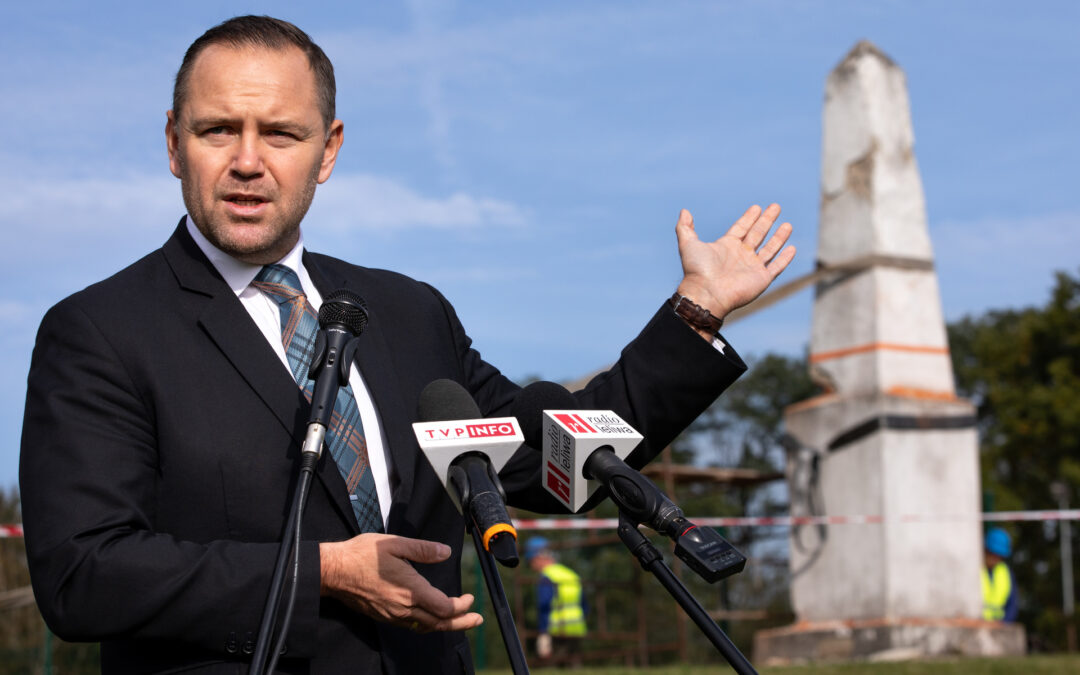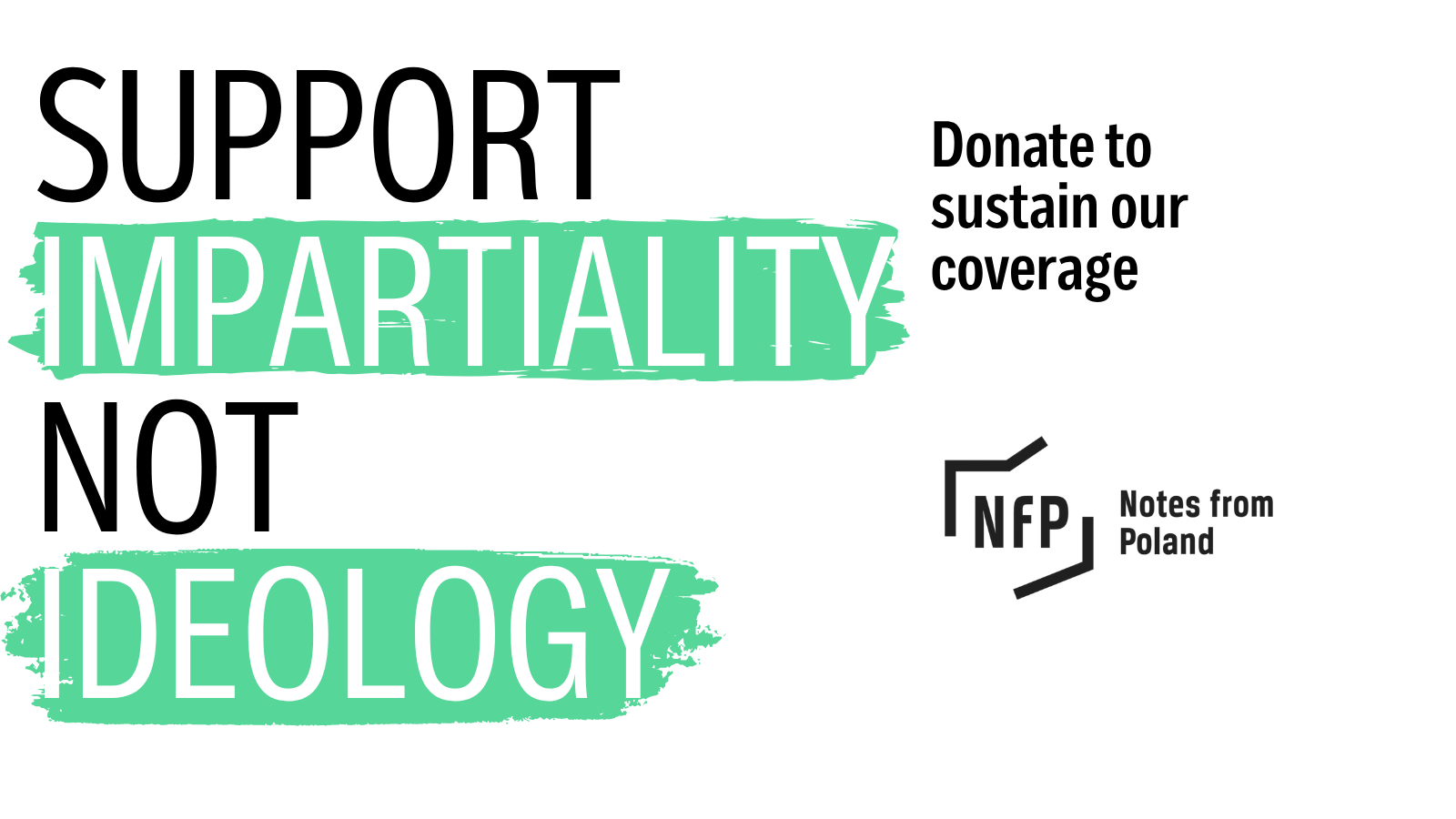Keep our news free from ads and paywalls by making a donation to support our work!

Notes from Poland is run by a small editorial team and is published by an independent, non-profit foundation that is funded through donations from our readers. We cannot do what we do without your support.
President Karol Nawrocki has submitted a request to the constitutional court for the Communist Party of Poland (KPP) to be declared unlawful. He argues that “there is no place in the Polish legal order for a party that glorifies criminals and regimes responsible for the deaths of millions, including our compatriots”.
His move follows the recent collapse of a long-running attempt initiated by the former national-conservative (PiS) government to have the KPP outlawed.
Prezydent Karol Nawrocki złożył wniosek do Trybunału Konstytucyjnego o delegalizację Komunistycznej Partii Polski. Uzasadnieniem są odwołania partii do totalitarnych metod, praktyk komunizmu oraz stosowania przemocy w celu zdobycia władzy.https://t.co/N0nXMXI2GD
— PolsatNews.pl (@PolsatNewsPL) November 12, 2025
The president’s office announced this week that, on 6 November, Nawrocki had submitted an application to the Constitutional Tribunal (TK), asking the court to determine that the KPP does not conform to the Polish constitution.
In his justification for the request, Nawroocki argued that “communist ideology is directed against fundamental human values and the traditions of European and Christian civilisation”. He noted that Poland itself “was and remains one of the greatest victims of communism”.
At the end of the Second World War, Poland was brought under the Soviet sphere of influence, with Moscow-backed communists ruling the country until 1989.
“The Polish state must take preventive action to ensure that such a situation never repeats itself in the history of our nation,” wrote Nawrocki, who pointed to the fact that Poland’s constitution prohibits parties “whose programmes are based upon totalitarian methods and the modes of activity of Nazism, fascism and communism”.
The KPP’s aims and activities are therefore “contrary to the legal order of Poland”, where “there is no place for a party that glorifies criminals and communist regimes responsible for the deaths of millions of human beings, including our compatriots”, wrote the president.
A previous version of the KPP’s website, now deleted, had a section dedicated to Joseph Stalin, calling him “the Liberator of Nations” and saying that his “immortal name will live forever in the hearts of all progressive humanity”.
“The Polish nation – which Stalin saved from annihilation and wrested from the hands of fascist bandits – has reason to harbour particularly warm feelings toward its saviour and defender,” read another section of the page.
The Soviet Red Army did drive Nazi Germany out of Poland at the end of the war, but Moscow then installed its own communist regime, which brutally suppressed those deemed opposed to or incompatible with the new order. It is estimated that tens of thousands of Poles were killed during this period.
Before becoming president, Nawrocki served as head of the state Institute of National Remembrance (IPN), where he oversaw efforts to demolish dozens of Soviet-era monuments that remain around Poland.
A building that served as a Soviet headquarters – and in which prisoners were detained, tortured and executed – has been bought by the Polish government and will be turned into a museum commemorating communist crimes https://t.co/wKGxLowLS9
— Notes from Poland 🇵🇱 (@notesfrompoland) July 8, 2021
The KPP was established in 2002 and claims to be the successor to the Communist Party that existed in Poland before World War Two, rather than the Soviet-backed Polish United Workers’ Party (PZPR) that ruled Poland after the war until 1989.
The KPP’s programme calls for “preparing working people for a joint and conscious struggle to eliminate exploitation by building a classless, democratic society within the framework of a socialist system”. The party has no elected representative at any level of government and very little public visibility.
The Rzeczpospolita daily notes that, in 2015, the KPP removed the call for communist revolution from its platform in order to avoid potential legal problems.
In 2020, Poland’s then justice minister and prosecutor general, Zbigniew Ziobro, also submitted a request to the TK to outlaw the KPP. Nawrocki, who is aligned with PiS and opposed to the current government, said in his submission last week that he “fully shared the arguments” presented then by Ziobro.
Poland's prosecutor general has moved to outlaw the country's Communist Party, arguing that it advocates totalitarian methods in violation of the constitution.
The party's leader denies the claims, saying that they seek revolution through democratic means https://t.co/lgdBY3gAxT
— Notes from Poland 🇵🇱 (@notesfrompoland) December 9, 2020
Rzeczpospolita notes that Ziobro’s request finally came before the TK on 1 October this year. However, the court indefinitely adjourned proceedings after the current prosecutor general and justice minister, Waldermar Żurek, did not attend the hearing, despite him being required to do so.
The current government, which replaced PiS in December 2023, does not recognise the legitimacy of the TK in its current form due to the presence of judges appointed unlawfully when PiS was in power.
The KPP celebrated last monht’s outcome, writing on social media: “We have once again defeated Zbigniew Ziobro. The party operates and will continue to operate legally.”
Back in 2020, when Ziobro filed his motion, the KPP said that his allegations were “far-fetched, taken out of context, taken from of publications which do not serve as the party’s manifesto documents, or completely untrue”.
“We are definitely not in favour of armed revolution and civil war. The situation is completely different than in 1917,” said the KPP.
“When we write ‘revolution’, we mean radical social changes leading to a significant improvement in the situation, because we believe that the present system is not able to solve many problems.”
A huge communist-era monument in Rzeszów – the city's most famous, but controversial, landmark – has been saved from demolition after being added to Poland’s list of protected monuments https://t.co/aKdS80V8RK
— Notes from Poland 🇵🇱 (@notesfrompoland) October 3, 2025

Notes from Poland is run by a small editorial team and published by an independent, non-profit foundation that is funded through donations from our readers. We cannot do what we do without your support.
Main photo credit: Mikołaj Bujak/IPN (under CC BY-NC-ND 3.0 PL)

Daniel Tilles is editor-in-chief of Notes from Poland. He has written on Polish affairs for a wide range of publications, including Foreign Policy, POLITICO Europe, EUobserver and Dziennik Gazeta Prawna.




















